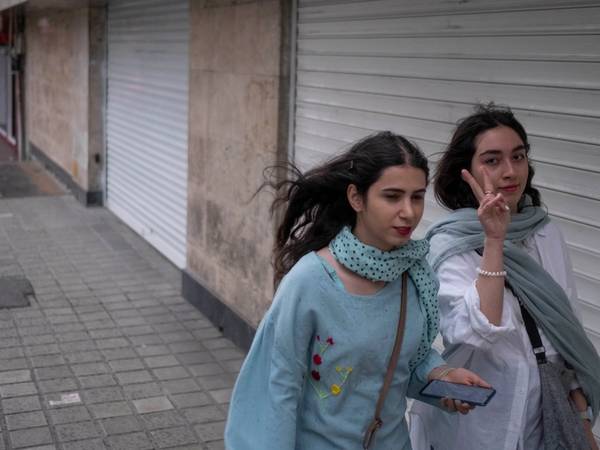Iranian rights activist Narges Mohammadi says women’s defiance to the mandatory hijab has shattered the authority of Iran’s oppressive religious regime.
In a letter sent out from Tehran’s Evin prison, she noted that the compulsory hijab is a ploy devised by the religious and anti-women government to exert "control over women" and "remove" them from the public life.
Her remarks came in reaction to the return of the notorious hijab or ‘morality’ police, which had vanished from the streets following nationwide protests sparked by the death of Mahsa Amini in the custody of hijab patrols last September.
Mohammadi stated that the world now witnesses the power of women's resistance, which has elevated them in Iranian society to a position never seen since the establishment of the Islamic Republic in 1979. “
“Iranian women have achieved power and a historical position in their struggle to create revolutionary and peaceful changes,” Mohammadi said.
The fight against compulsory hijab is “a matter of freedom and liberation from tyranny, an issue of justice against oppression, a means to achieve peace, democracy, and human rights, and breaking free from violence and discrimination."
Highlighting the regime’s "inability" to confront Iranian women who are fighting for their basic rights, she said, "The terrified regime is engaged in a fierce struggle to prevent its collapse, but it is clear that it has no hope of succeeding."
A lawyer often defending dissidents, Mohammadi has been imprisoned several times over the past two decades for her work fighting for human rights. She is the vice-president of the Defenders of Human Rights Association, the Chair of the executive board of the Peace Council of Iran, and a member of "Step-by-Step Abolition of Execution" campaign.
She was freed from Evin Prison in September 2020 after serving more than five years on trumped up charges, without due process of law. She was arrested again on November 16, 2021, released for a short time and one year later was detained again. Currently, she is serving a total sentence of 9 years and 8 months, along with 154 lashes and additional penalties in Evin Prison. She has also been denied access to medical care amid deteriorating health and was deprived for long periods of any contact with her husband and children who live abroad.
The return of morality police patrols’ has immediately led to online uproar as well as a few bouts of street protests, the biggest of which broke out in the northern city of Rasht.
As the anniversary of the Mahsa Movement in September approaches, the regime is worried about the possibility of unrest in universities spilling over to the streets.
“The enemy has not given up. They’ve said that universities are the first place where new riots should begin,” the official in charge of Supreme Leader Ali Khamenei’s representatives in universities across the country, Mostafa Rostami, said at a gathering.
People on social media have reacted to the resurgence of hijab patrols, saying if Iranians do not pour into the streets on Amini's death anniversary, the regime will further tighten the noose.
Iran’s former president Mohammad Khatami also warned that the return of morality police may lead to the regime's overthrow by itself and social collapse. “It seems that the danger of self-overthrow, which has been talked about many times, stands out more than ever with the return of morality police."
Top officials of the regime refuse to take responsibility due to “concern over the upcoming elections," according to Tehran's leading reformist daily, Etemad. President Ebrahim Raisi's aides have advised him against implementing any plan that could provoke people until after the next presidential election in 2025 to secure his re-election.
